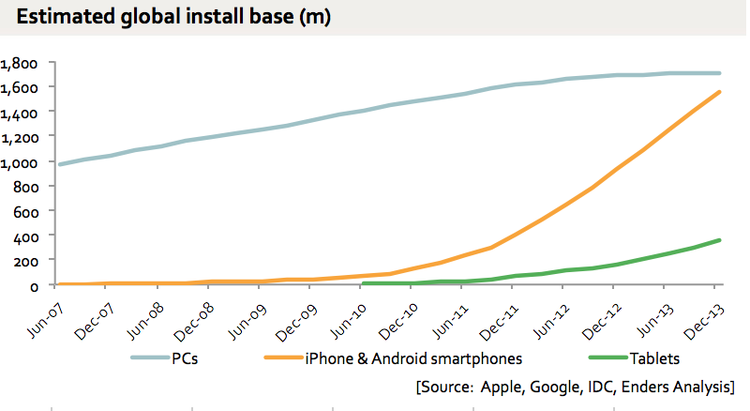The move to mobile is not new but a recent milestone foreshadows a titanic change in the basic way most people will interact with and think of the internet. Sometime this month it is forecast that the number of internet connected smart phones on the earth will pass the total number of PCs.
The two markets will intersect at roughly 1.6B units and it’s estimated that smartphones will then continue to grow to more than 3B units, roughly double the number of PCs. Of those 1.6B PCs about half or 800M are locked-down, corporate PCs which were never very personal and barely mobile. With most companies moving to a ‘BYOD’ policy, nearly all smartphones will be highly personal offering always connected, ‘in your pocket’ mobile internet connectivity. So going forward the internet’s reach will continue to grow much larger and it will now become much more mobile and personal.
The implications of this rapid move to mobile will be felt in many ways but one profound difference will be in the basic way most people interact with the internet. While the browser is the typical gateway to the internet on the PC, in an application most mobile internet interaction is shielded from the user as it happens automatically in the background. The typical mobile user doesn’t know or care where the application is going on the internet as long as the app delivers the information or content that they need.
This move to an application interface versus browser interface will change the way most people experience and think of the internet. Browsers won’t actually go away but URLs will become less in focus. Websites also won’t go away but they will evolve to become a collection of Application Programmers Interfaces (APIs) that developers will use to access services, information, documents etc. while using the internet as the underlying service layer.
Thus the “Appification” of the internet has started and will grow faster over the coming years as the ‘Perfect Storm’ mobile forces (smartphone numbers, wireless data performance/availability and tools/cloud infrastructure) combine to accelerate the move to mobile. The Appification process will travel different paths due to the forces driving the consumer versus business markets. Consumer apps will continue to be driven by evolving monetization models and the market share battles of mobile app platforms (Facebook vs Twitter vs Snapchat vs WhatsApp…) , while business apps will be driven more on productivity gains and increased customer interaction.
For businesses, now is the time to fundamentally readdress your own concept of the internet and to start looking closer at what you need to do internally and externally to leverage the Appification movement, improve your business and meet your customer’s evolving mobile expectations. If you have questions concerning how the Applification process will affect your current business and how you can leverage it to your advantage, please contact us to discuss new mobile strategies.

